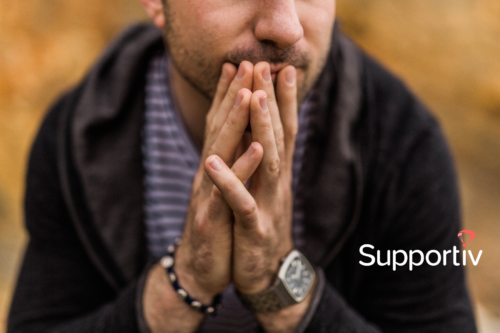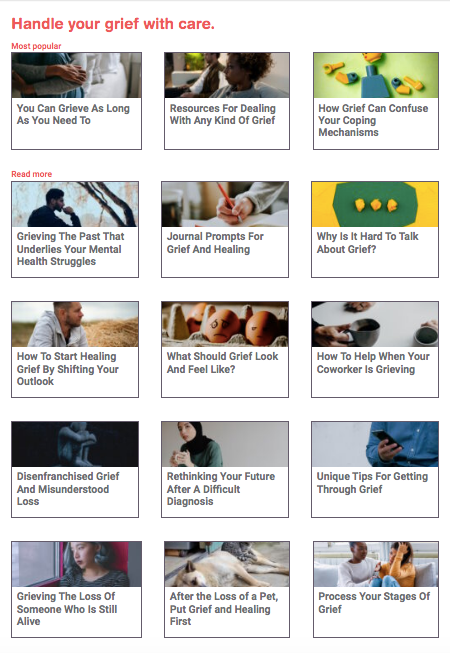To Meet Escalating Need For Grief Support, Supportiv Publishes New Grief Article Collection

To address the many forms of grieving, Supportiv releases a new collection of Grief articles, as nationwide demand for grief-related mental health resources continues to grow.
When grief shakes one’s world, coping, healing, and recovery aren’t always instinctual. The grieving process also goes beyond the death and tangible loss we usually think of.
“What happens when others don’t understand what you are mourning? So many grief-worthy events still feel marginalized from discussions about grieving: becoming estranged from family members, experiencing ethnic or racial inequity, or mourning the past that shaped your current struggles–just to name a few,” shares Supportiv CEO & Co-Founder Helena Plater-Zyberk.
“A big part of the grieving process is learning to own your individual experience, because no two experiences of grief will be exactly alike. That said, being open about your own experience may also help someone else feel less alone in theirs.”
Supportiv Co-Founder Pouria Mojabi speaks to the escalating societal need for grief resources: “With over one million COVID deaths in the US to date, an estimated nine million people are currently grieving a loved one for that reason alone. However, deaths are just one of the many types of grief-worthy events one might face. For example, each year, hundreds of thousands get divorced, receive difficult medical diagnoses, and see the ends of friendships.”
Supportiv’s new grief articles and resources deliver considerations and guidance to get through the grieving process–no matter what set the process in motion. Topics in the collection include:
What Should Grief Look And Feel Like?
Learning about the various ways grief can look and feel may help you identify them and take the first step toward healing.
You Can Grieve As Long As You Need To
Grieving is known to take a long time. So, why does prolonged grief disorder exist? And what distinguishes it from normal grief?
Why Is It Hard To Talk About Grief?
Responding to grief is rarely instinctual, whether it’s your own or others’. It can be hard to talk about grief, even when you know you need to.
How Grief Can Confuse Your Coping Mechanisms
Grief can overwhelm your usual coping mechanisms. How and why does this happen? And to what extent should you accept your difficulty in coping?
Resources For Dealing With Any Kind Of Grief
Dealing with grief involves feeling your feelings, accessing tangible and emotional support, and using the resources available to you. Here is a list of resources to help you find the help you need.
Disenfranchised Grief And Misunderstood Loss
What is disenfranchised grief, and why does it matter how others respond to your mourning?
How To Start Healing Grief By Shifting Your Outlook
When everything feels dark and you can’t imagine a world where it gets better, start healing grief by shifting your outlook on the process.
How To Help When Your Coworker Is Grieving
How do you help a coworker who is grieving? We all have different relationships with our coworkers, which can change how we support them.
Unique Tips For Getting Through Grief
These unique grief tips are designed to help you manage, process, cope with, and otherwise get through the grieving process.
Grieving The Past That Underlies Your Mental Health Struggles
Trauma and difficult past experiences can have mental health consequences through no fault of your own. It’s worth grieving the connection.
Journal Prompts For Grief and Healing
Our instincts may fail us while we’re grieving. Journaling can help structure the process and help us find meaning in clouds of emotion.
Grieving The Loss Of Someone Who Is Still Alive
Grief isn’t reserved just for actual deaths. Rather, grief can arise in any situation where there is a loss–or even just the potential for loss.
Rethinking Your Future After A Difficult Diagnosis
When you or a loved one receive a difficult diagnosis, you naturally think about how it impacts your future. How do you grieve what’s changed and find a new path forward?
After the Loss of a Pet, Put Grief and Healing First
Our pets are more than worthy of our grief. In many cases, the loss of a pet means losing the deepest relationship in our life.
How To Cope After A Coworker’s Suicide
After a coworker’s suicide, ensure you have appropriate support for yourself. It’s like putting on your own oxygen mask, and that’s ok to do.
Covid’s Disproportionate Filipino-American Deaths: Grieving And Coping
Filipino-Americans have seen more fatalities from covid than other ethnic groups, putting them more in need of grieving and coping resources.
Process Your Stages Of Grief (worksheet)
Part of why grief feels so messy, is that we may experience its conflicting stages at once. Use this worksheet to help process the stages.

Find help for grieving in the full grief article collection, view the full press release, learn more about peer support, or check out real user testimonials for Supportiv.
Contact Us
For anonymous peer-to-peer support, try a chat.
For organizations, use this form or email us at info@supportiv.com. Our team will be happy to assist you!
